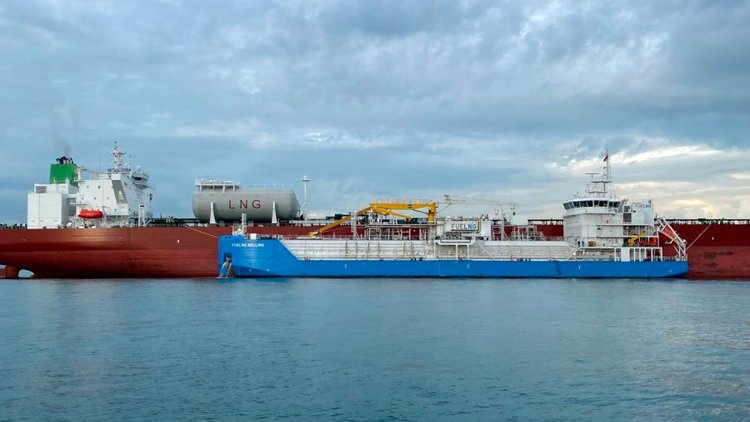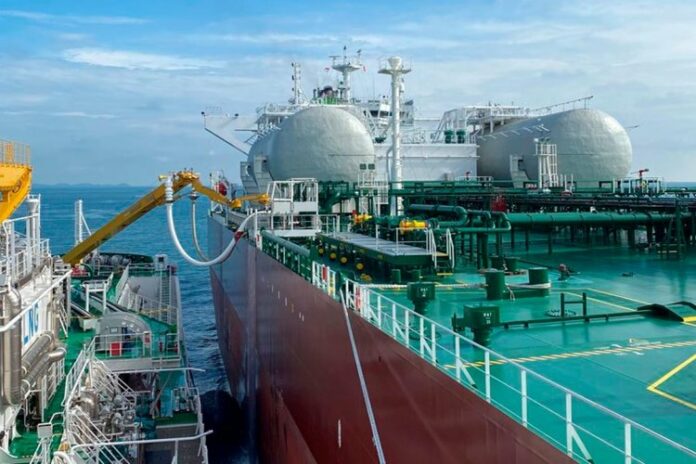The bunkering operation was carried out by FueLNG Bellina, Singapore’s first Liquefied Natural Gas (LNG) bunkering vessel
FueLNG, together with the Maritime and Port Authority of Singapore (MPA), has completed Singapore’s first bunkering of an LNG-fuelled oil tanker today. FueLNG is a joint venture between Keppel Offshore & Marine Ltd (Keppel O&M) and Shell Eastern Petroleum (Pte) Ltd.
FueLNG successfully completed the gas-up and cool down operation for the LNG-powered oil tanker ‘Pacific Emerald’, including the transfer of 3,000m3 of LNG from FueLNG Bellina, Singapore’s first LNG bunkering vessel, to the tanker.
Pacific Emerald is the first of 10 newbuild Aframax tankers chartered by Shell Tankers Singapore (Private) Limited from Sinokor Petrochemical Co Limited.
FueLNG is committed to promoting the adoption of LNG as a marine fuel and has been working closely with partners including MPA to boost the growth of Singapore as a global LNG bunkering hub.
Ms Quah Ley Hoon, Chief Executive of MPA, said:
“Singapore is pleased to have carried out the first ship-to-ship LNG bunkering for an oil tanker in the Port of Singapore. Today marks another milestone in Singapore’s journey as an LNG bunkering hub. We see increased interest in LNG-fuelled vessels with more of such new vessels on order across various ship types. We look forward to an increase in uptake of LNG as a marine fuel in the Port of Singapore.”

Mr Chris Ong, Chairman of FueLNG and CEO of Keppel O&M, said:
“We are pleased to mark another significant milestone for LNG bunkering in Singapore. There is strong demand for LNG bunkering in Singapore and FueLNG, as a pioneer in this sector, is well-equipped with the experience and technical expertise to provide reliable bunkering solutions for customers. This is in line with Keppel’s Vision 2030 which includes seizing opportunities in LNG. As the industry explores more sustainable marine fuels for the long term, LNG is an important part of the energy transition that enables the Port of Singapore to provide shipowners with the option to reduce vessel emissions today.”
Tahir Faruqui, Director of FueLNG and Head of Shell Downstream LNG, said:
“We are grateful to Keppel and MPA for their support in enabling yet another first for Singapore. Emissions are cumulative, and the shipping sector simply cannot afford inaction. LNG is the lowest emission fuel available at scale in the shipping sector today and has a key role in its decarbonisation journey. Shell is actively investing in building a global LNG bunkering network to support the sector with capabilities to tackle emissions with urgency. We are also investing in LNG for our own long-term charter fleet to deliver our products like the oil tanker fuelled today.”
This milestone follows the completion of Asia’s first ship-to-containership LNG bunkering operation by FueLNG in March 2021.
The bunkering of the Aframax oil tanker is also a demonstration of the FueLNG Bellina’s versatile capabilities to provide LNG bunker and conduct the gas-up and cool down operation for receiving vessels with different types of cargo tanks such as Type B and GTT membrane tanks.
FueLNG aims to provide a total of about 30 to 50 ship-to-ship LNG bunkering operations in 2021. Besides the Aframax tankers, FueLNG has also lined up bunkering operations for containerships, chemical oil tankers, and bulk carriers.
Currently, LNG is an immediately available fuel solution that can reduce the environmental impact of maritime transport. The use of LNG as a marine fuel reduces greenhouse gas emissions by up to 23% on a well-to-wake basis, compared to current oil-based marine fuels. Vessels that use LNG also emit significantly less of the three main pollutants: 99% less sulphur dioxide, 91% less particulate matter and 92% less nitrogen oxide, compared to oil-based marine fuels.



